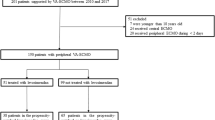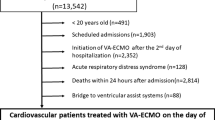Abstract
Purpose
Despite extensive research on enteral nutrition (EN) for patients in shock, it remains unclear whether this should be postponed in patients with cardiogenic or obstructive shock requiring venoarterial extracorporeal membrane oxygenation (VA-ECMO). In this study, we aimed to compare outcomes of early and delayed EN for patients with cardiogenic or obstructive shock requiring VA-ECMO.
Methods
In this retrospective database study drawing on the Japanese Diagnosis Procedure Combination inpatient database from July 2010 to March 2016, we identified patients with cardiogenic or obstructive shock who had received VA-ECMO for more than 2 days. We allocated the patients to two groups: those who received EN within 2 days (early) or 3 days or more (delayed) after starting VA-ECMO. We then used a marginal structural model to analyze associations between early EN and various outcomes, including in-hospital mortality and 28-day mortality.
Results
We identified 1769 eligible patients during the 69-month study period, 220 of whom (12%) received early EN. After using a marginal structural model to adjust for baseline and time-dependent confounders, we found that the early EN group showed significantly lower in-hospital mortality [hazard ratio 0.78, 95% confidence interval (95% CI) 0.62–0.98, P = 0.032] and lower 28-day mortality (hazard ratio 0.74, 95% CI 0.56–0.97, P = 0.031) than the delayed EN group.
Conclusions
According to this retrospective database study, early EN is not associated with harm but rather with lower mortality in patients with cardiogenic or obstructive shock requiring at least 2 days of VA-ECMO.

Similar content being viewed by others
References
Ventetuolo CE, Muratore CS (2014) Extracorporeal life support in critically ill adults. Am J Respir Crit Care Med 190:497–508. https://doi.org/10.1164/rccm.201404-0736CI
Aso S, Matsui H, Fushimi K, Yasunaga H (2016) In-hospital mortality and successful weaning from venoarterial extracorporeal membrane oxygenation: analysis of 5263 patients using a national inpatient database in Japan. Crit Care 20:80. https://doi.org/10.1186/s13054-016-1261-1
Gaffney AM, Wildhirt SM, Griffin MJ, Annich GM, Radomski MW (2010) Extracorporeal life support. BMJ. https://doi.org/10.1136/bmj.c5317
Reignier J, Boisrame-Helms J, Brisard L et al (2018) Enteral versus parenteral early nutrition in ventilated adults with shock: randomised, controlled, multicentre, open-label, parallel-group study (NUTRIREA-2). Lancet 13(391):133–143. https://doi.org/10.1016/s0140-6736(17)32146-3
Schunn CD, Daly JM (1995) Small bowel necrosis associated with postoperative jejunal tube feeding. J Am Coll Surg 180:410–416
Scott LK, Boudreaux K, Thaljeh F, Grier LR, Conrad SA (2004) Early enteral feedings in adults receiving venovenous extracorporeal membrane oxygenation. JPEN J Parenter Enter Nutr 28:295–300. https://doi.org/10.1177/0148607104028005295
Lukas G, Davies AR, Hilton AK, Pellegrino VA, Scheinkestel CD, Ridley E (2010) Nutritional support in adult patients receiving extracorporeal membrane oxygenation. Crit Care Resusc 12:230–234
Umezawa Makikado LD, Flordelis Lasierra JL, Perez-Vela JL, Colino Gómez L, Torres Sánchez E, Maroto Rodríguez B, Arribas López P, Montejo González JC (2013) Early enteral nutrition in adults receiving venoarterial extracorporeal membrane oxygenation: an observational case series. JPEN J Parenter Enter Nutr 37:281–284. https://doi.org/10.1177/0148607112451464
Ferrie S, Herkes R, Forrest P (2013) Nutrition support during extracorporeal membrane oxygenation (ECMO) in adults: a retrospective audit of 86 patients. Intensive Care Med 39:1989–1994. https://doi.org/10.1007/s00134-013-3053-2
Reintam Blaser A, Starkopf J, Alhazzani W et al (2017) Early enteral nutrition in critically ill patients: ESICM clinical practice guidelines. Intensive Care Med 43:380–398. https://doi.org/10.1007/s00134-016-4665-0
Yamana H, Moriwaki M, Horiguchi H, Kodan M, Fushimi K, Yasunaga H (2017) Validity of diagnoses, procedures, and laboratory data in Japanese administrative data. J Epidemiol 27:476–482. https://doi.org/10.1016/j.je.2016.09.009
Heyland D, Dhaliwal R, Drover J, Gramlich L, Dodek P et al (2003) Canadian clinical practice guidelines for nutrition support in mechanically ventilated, critically ill adult patients. JPEN J Parenter Enter Nutr 27:355–373
Kreymann K, Berger M, Deutz N, Hiesmayr M, Jolliet P et al (2006) ESPEN guidelines on enteral nutrition: intensive care. Clin Nutr 25:210–223
McClave S, Taylor B, Martindale R, Warren M, Johnson D et al (2016) Guidelines for the provision and assessment of nutrition support therapy in the adult critically ill patient. JPEN J Parenter Enter Nutr 40:159–211
Doig G, Heighes P, Simpson F, Sweetman E, Davies A (2015) Early enteral nutrition, provided within 24 h of injury or intensive care unit admission, significantly reduces mortality in critically ill patients: a meta-analysis of randomised controlled trials. Intensive Care Med 35:2018–2027
Schmidt M, Burrell A, Roberts L, Bailey M, Sheldrake J et al (2015) Predicting survival after ECMO for refractory cardiogenic shock: the survival after veno-arterial-ECMO (SAVE)-score. Eur Heart J 36:2246–2256
Shigematsu K, Nakano H, Watanabe Y (2013) The eye response test alone is sufficient to predict stroke outcome—reintroduction of Japan Coma Scale: a cohort study. BMJ Open 3:e002736
Quan H, Li B, Couris CM, Fushimi K, Graham P, Hider P, Januel JM, Sundararajan V (2011) Updating and validating the Charlson comorbidity index and score for risk adjustment in hospital discharge abstracts using data from 6 countries. Am J Epidemiol 173:676–682. https://doi.org/10.1093/aje/kwq433
Robins J, Hernán M, Brumback B (2000) Marginal structural models and causal inference in epidemiology. Epidemiology 11:550–560
Hernán M, Brumback B, Robins J (2000) Marginal structural models to estimate the causal effect of zidovudine on the survival of HIV-positive men. Epidemiology 11:561–570
Cole SR, Hernan MA (2008) Constructing inverse probability weights for marginal structural models. Am J Epidemiol 168:656–664
VanderWeele TJ, Ding P (2017) Sensitivity analysis in observational research: introducing the E value. Ann Intern Med 167:268–274
Gianotti L, Alexander J, Nelson J, Fukushima R, Pyles T et al (1994) Role of early enteral feeding and acute starvation on postburn bacterial translocation and host defense: prospective, randomized trials. Crit Care Med 22:265–272
Gramlich L, Kichian K, Pinilla J, Rodych N, Dhaliwal R, Heyland DK (2004) Does enteral nutrition compared to parenteral nutrition result in better outcomes in critically ill adult patients? A systematic review of the literature. Nutrition 20:843–848
Kang W, Kudsk K (2007) Is there evidence that the gut contributes to mucosal immunity in humans? JPEN J Parenter Enter Nutr 31:246–258
Kudsk K (2002) Current aspects of mucosal immunology and its influence by nutrition. Am J Surg 183:390–398
Windsor A, Kanwar S, Li A, Barnes E, Guthrie J, Spark JI, Welsh F, Guillou PJ, Reynolds JV (1998) Compared with parenteral nutrition, enteral feeding attenuates the acute phase response and improves disease severity in acute pancreatitis. Gut 42:431–435
Braga M, Gianotti L, Gentilini O, Parisi V, Salis C, Di Carlo V (2001) Early postoperative enteral nutrition improves gut oxygenation and reduces costs compared with total parenteral nutrition. Crit Care Med 29:242–248
Zhao L, Luo L, Chen J, Xiao J, Jia W, Xiao Y (2014) Utilization of extracorporeal membrane oxygenation alleviates intestinal ischemia-reperfusion injury in prolonged hemorrhagic shock animal model. Cell Biochem Biophys 70:1733–1740. https://doi.org/10.1007/s12013-014-0121-3
Acknowledgements
This work was supported by grants from the Ministry of Health, Labour and Welfare of Japan (H29-Policy-Designated-009 and H29-ICT-General-004); Ministry of Education, Culture, Sports, Science and Technology of Japan (17H04141); and Japan Agency for Medical Research and Development.
Author information
Authors and Affiliations
Corresponding author
Ethics declarations
Conflicts of interest
All authors declare that they do not have any conflicts of interest.
Electronic supplementary material
Below is the link to the electronic supplementary material.
Rights and permissions
About this article
Cite this article
Ohbe, H., Jo, T., Yamana, H. et al. Early enteral nutrition for cardiogenic or obstructive shock requiring venoarterial extracorporeal membrane oxygenation: a nationwide inpatient database study. Intensive Care Med 44, 1258–1265 (2018). https://doi.org/10.1007/s00134-018-5319-1
Received:
Accepted:
Published:
Issue Date:
DOI: https://doi.org/10.1007/s00134-018-5319-1




